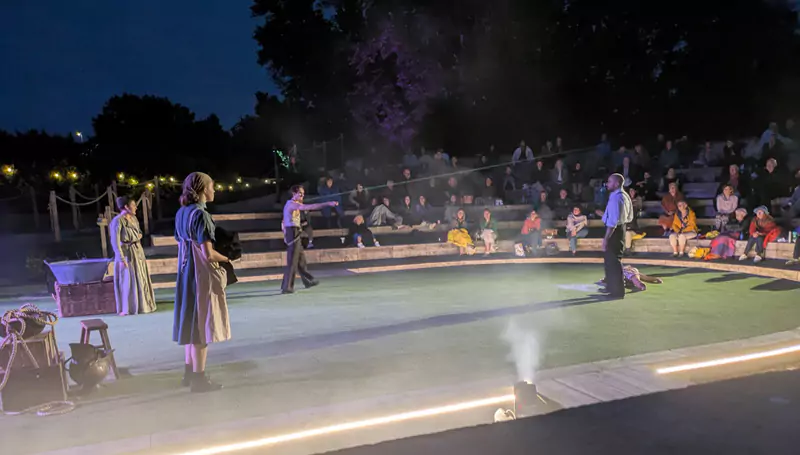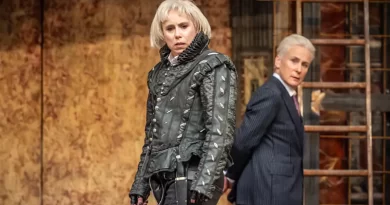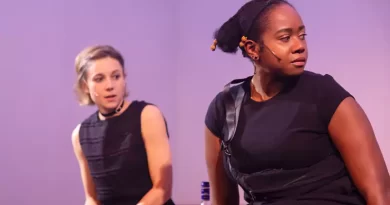“Electra”, Sophocles, Brighton Open Air Theatre BOAT
Simon Jenner in East Sussex
7 August 2025
Anne Carson’s translations of Greek tragedy – like Antigone – have reframed many recent productions in genre; those plays that wind up like remorseless clockwork over 75 minutes and then snap.
But no productions of Carson’s versions have – that I know of – given rise to another. Until this year. Director Conor Baum was so incensed by what he felt was mishandling of a recent production of Carson’s fleet take of Sophocles’ Electra, he decided to produce his own. The venue means it’s set in the open amphitheatre conditions of its Greek origins, if a smaller space. And Baum starts at 8pm so that darkness mounts in the last half hour to breathtaking effect.
This is a faithful and revelatory reading: remorseless yet clear to the last syllable. There is a stark use of props (costumes designed by Baum, lighting and ominous sound by Bev Grover), and more formal use of the concrete wings. There is much use of smoke too. Electra is besmirched, Orestes is travel-dusted. Others are sober or resplendent: self-preening in flowers, jewels or braces. There are some baskets and an urn. Nothing else is needed as shadows lengthen. Evening glooms remorselessly.
Eugene O’Neill’s Mourning Becomes Electra, from 1931 set just after the Civil War, has more backstory; but there is kinship here. Baum and Carson though plunge straight in and the end is extraordinary too. We forget where the original ends (there is often a bit tacked on) and the virtue of this production is to remind you of how stark, how brief and how broodingly tense the material is.
The cast projects with clarity and there is no need for micing-up. Spatially they make good use of BOAT’s large promontory. Characters appear from the periphery above the audience and descend, stride and wheel in the horseshoe.
Though we start with men, the five women in the eight-strong cast dominate. Ethan McHale’s Orestes makes an impact to begin, full of angst, doubt and an undelivered lightning bolt of fury: he’s come to avenge his mother Clytemnestra and her lover Aegisthus’s murder of his father Agamemnon. In the final scenes, his bloody work is released and forked vengeance finds its ground. But he has to hide until over two thirds of the way through (there is a great scene with sister Electra), urged on by Tim Swinton’s assured Paedagogus.
Paedagogus is also able to deliver the fake news that Orestes has died in a Delphic chariot race to reassure his mother she won’t face revenge. Swinton is particularly good at suggesting a guileless truth-teller, an academic sort not capable of plot: until he’s alone with conspirators. The House of Atreus isn’t a happy one.
Christine Kempell gleams with pleasured malice as Clytemnestra, and her robes shimmer with it as she twists past her daughter, shivering with anticipation. Clytemnestra intends to wall up Electra for good, in the ground. But as she reminds Electra, she was avenging the ritual slaughter of her eldest daughter Iphigenia, to propitiate the Greek sack of Troy since Neptune wouldn’t let them sail. Agamemnon was avenging a wrong done to his hapless brother, Menelaus. His wife Helen’s was “abducted” or eloped. So why not one of their children? Good point.
Her lover Jonathan Howlett’s Aegisthus ripples with Alpha arrogance, is bold and has both dignity and a sense of fate as he is ushered into it, almost with calm acceptance.
This though is primarily about how women wait to be released from stasis by men: Gypsy Pavlo-Ruffell with youthful ardour and Sharon Drain with tremendous affect and gravitas urge on and counsel Electra – and others – as the two Chorus. Clearly on the side of justice, they take on supernatural prophesy. “Foresight” they declaim, putting them at one with Paedagogus and his strategies. Their unnamed roles are larger than ‘Chorus’ might suggest. They amplify, empathise, impel.
Madeleine Schofield’s sympathetic but pacific Chrysothemis is iridescent, gleaming as her mother but loyal in her own way to her sister. Bedecked with flowers and bows, which she occasionally offloads on the Chorus, she’s the voice of ordinary reason. As with Antigone, there is a “normal” sister who just wants love, marriage, the good life. But Schofield manages to render her both warm yet scornful. Bedecked like a business influencer (though not quite contemporary) this Chrysothemis mainlines a little of her mother’s briskness.
All though hinges on Chrysothemis’s sister. As Electra, Lexi Pickett rises up from dust and falls back there. But Pickett judders with almost extinguished hope, leads a posthumous life almost as a widow on the subcontinent waiting for the conflagration of Sutti, or a husband’s funeral pyre. Electra’s obsession with Orestes is about one kind of release, but there’s almost a sexual one too. In some versions it ends with a release from life (as in Strauss’s 1909 opera Elektra) at the end; as if nothing else can succeed it. Though (spoiler!) Orestes will be pursued by Furies for a bit.
Pickett however erupts from another place altogether. Vocally they’re tremendous, smouldering yet controlled, from hiss to clarion call. Whether lambasting or scorning a mother, or sister, Pickett’s venom is implacable, just like Antigone: Electra is the conscience of the house and a ragged Pickett embodies this. Scorned and adamantine as they rise and turn: nothing in their body is hurried; a furious sibyl. In the open air Pickett’s voice gains in declamatory power. There is release but it won’t be death, or even love, but as Pickett twists in grief over the supposed urn of Orestes, the sudden recognition of McHale’s Orestes is the first shock of what will come. The two actors overwhelm; and Pickett raises their grimed head shining with exaltation, like sun through storm clouds. Here that is set off as the trip-lights activate in the gloom.
The end is set. Baum directs that ratcheting-up inexorably: never hurried, never static. And there’s a shock change to one revenge specially rendered for BOAT. Outstanding.









